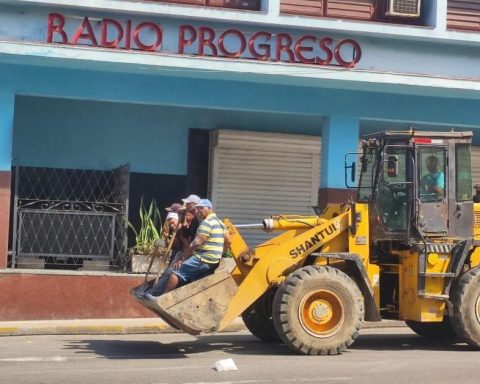The Government responded to the statements of the mayor of Providencia, Evelyn Matthei, who assured that the Carabineros committed human rights violations during the multiple demonstrations of the social outbreak of 2019 because the officials “did not have the way to defend themselves.”
The first to refer to Matthei’s statements was President Gabriel Boric, who via Twitter stated that “human rights violations are never justified, and entering into this argumentative drift is very dangerous for democracy. Clearly supporting the Carabineros in the fight against crime, of which I have no doubt, it is not at the expense of human rights.”
Matthei used the same social network to reply to the head of state, affirming that “President I notice you are obsessed with mayors. You, who have given yourself so much somersault and prevented the approval of laws that defend Chileans and Carabineros, surely write without all the background. Respectfully, mature and govern, we need the best of you.”
On the other hand, the Minister of the Interior, Carolina Tohá, maintained that the mayoress of Providencia “has made a mistake with that phrase”, and that human rights must always be respected. Likewise, she pointed out that when human rights are not respected, that is when “the police are weaker.”
“The mayor has made a mistake with that phrase. The protection of the police cannot rest on the weakness of the defense of human rights. It is a serious mistake that is not new, many times we have met people who believe that to protect national security, human rights must be weakened. There are people who believe that in order to defend their moral or religious principles, they must go over human rights. There are people who think that in order to protect their political project, they must go over the human rights,” declared the Secretary of State.
“But those who really believe in human rights know that they must be respected in all circumstances. That they should not be a limit; on the contrary, where human rights are not respected is where the police are weakest, where they are most questioned It is where the police are permanently fragile in their legitimacy,” he added.
It should be remembered that Matthei’s statements occurred in the midst of various consultations about the institution having greater freedoms in the use of weapons, although that could refloat the human rights violations committed during the social outbreak. “If there were human rights violations, it was because they (Carabineros) had no way to defend themselves,” he told TVN.
In view of the above, the head of the Interior concluded that “I would tell Mayor Matthei, get out of there, from that place where human rights are opposed to other principles. Let’s go to that place where human rights are always protected. When it suits us and when it doesn’t suit us, when they belong to our friends and when they belong to our adversaries. When it is functional for our project and when it is uncomfortable for our project. That is the only true land of human rights.”
Chamber of Deputies approves five security projects
In the midst of the long day that the Chamber of Deputies and Deputies recorded and discussed and approved five bills related to public safety after the murder of the second sergeant of the Carabineros, Rita Olivares.
The first of them, the “anti-hitman” project, which penalizes anyone who conspires to commit a hitman, that is, qualified homicide for a reward or promise of remuneration or by any other means that implies intention profit.
The second is the bill that reinforces the powers of the Chilean Gendarmerie and creates a general crime of extortion, makes the conditions for the intervention of the Gendarmerie more flexible as an auxiliary to the investigation. In addition, it allows the Gendarmerie to access the Unified Data Bank to fulfill its function as custodian.
The initiative that expands the powers of police control in migration matters, establishes a modification in the effective application of the penalties established for the crimes of theft, robbery and reception, and improves criminal prosecution in said crimes was also endorsed. If a person cannot prove that they are in a regular migratory situation, the official must transfer the individual to make them available to the PDI within the shortest term, which may not exceed one hour, to corroborate their migratory situation.
The police official must consider as valid documents (to prove immigration status) his current identity card, the certificate issued by the National Migration Service, which consists of the fact that the person made a request for the granting, change or extension of a residence permit. , or the resolution issued by the immigration authority stating the granting of a residence permit.
In this regard, the Minister of the Interior, Carolina Tohá, pointed out that the approved projects “will allow us to better prosecute and punish serious crimes that we are seeing in our cities, such as kidnapping, assassination, extortion.”
“It will allow the Gendarmerie to have more powers to collaborate in criminal investigations, penalize more forcefully those who illegally carry weapons in crowded places and it is a project that will mean more effective mechanisms to control irregular migration,” added.
After the approval of the measures, the head of the Interior indicated that “a day of intense work is not going to solve the challenges we have in terms of security. What we need is to take this as proof that we can work more and better, as a sign that if we set ourselves demanding goals, we can, within a reasonable period of time, dispatch projects that are very important”.
Hours before, the Corporation approved by a wide margin the bill that modifies the Criminal Code to aggravate the penalties for the crime of kidnapping, an initiative presented on December 12 by the Executive. The measure managed to be endorsed with 143 votes in favor, none against or abstention.
Then, it was the turn of the initiative that seeks to toughen the regulation of weapons in the country, and that increases the penalty for the crime of carrying weapons in highly crowded places. The project, which had great urgency on the part of the Government, was supported with 147 votes in favor, without abstentions or negative votes.
In this way, all the aforementioned initiatives approved will fall to the Senate, where they must continue with their legislative process to finally become law.


















